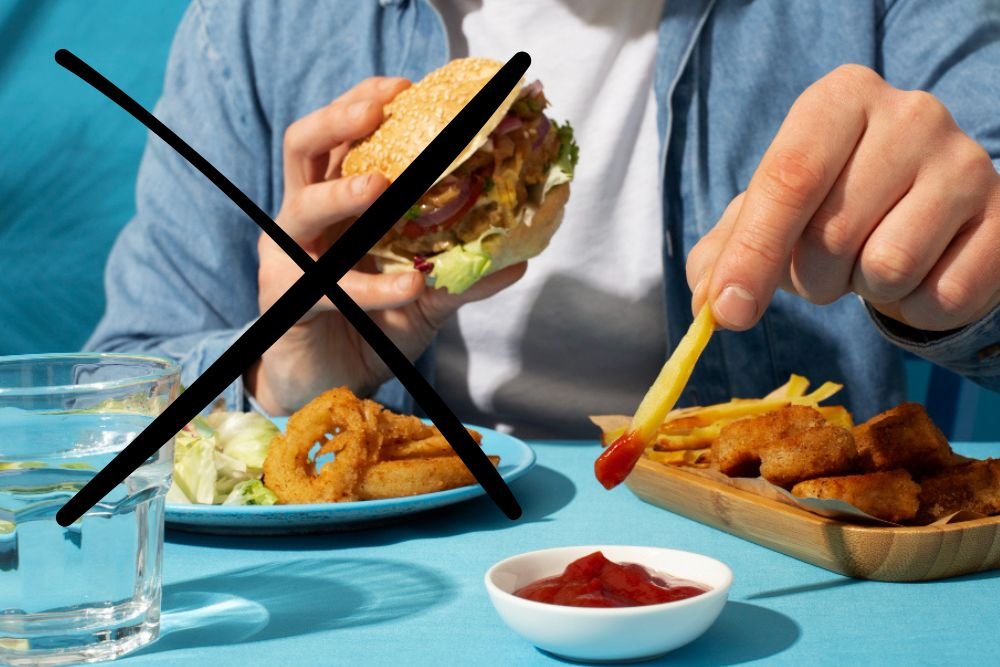5 Foods That Are Slowly Damaging Your Liver:
The liver is a vital organ responsible for detoxifying the blood, processing nutrients, and aiding in digestion. Its efficient functioning is crucial to maintaining overall health, but many unknowingly consume foods that gradually harm it. Over time, these foods can lead to conditions such as fatty liver disease, inflammation, and even cirrhosis. Knowing which foods silently damage your liver can help you make healthier choices and protect your health. This article explores 5 Foods That Are Slowly Damaging Your Liver and offers tips to minimize their impact.
1. Sugary Foods and Drinks
One of the biggest culprits of liver damage is sugar. Foods and beverages high in sugar, especially those containing added fructose or high-fructose corn syrup, can lead to a build-up of fat in the liver, potentially causing non-alcoholic fatty liver disease (NAFLD). Sugary foods and beverages force the liver to metabolize excess fructose, converting it into fat that accumulates within the liver cells.
The Process: How Sugar Affects the Liver
The liver is the primary organ responsible for processing fructose, which is converted into glucose and used for energy. However, when fructose intake exceeds what the body requires, the liver begins to convert it into fat. This stored fat can lead to a condition known as hepatic steatosis, or fatty liver. Over time, fatty liver can progress to inflammation (steatohepatitis) and even liver fibrosis, which can increase the risk of cirrhosis and liver failure.
Ways to Cut Down on Sugar Intake
- Choose natural alternatives: Fresh fruits contain natural sugars but also provide fiber, vitamins, and antioxidants that support liver health.
- Limit processed snacks: Many snacks contain added sugars, so read labels carefully and opt for healthier alternatives.
- Skip sugary drinks: Sodas, energy drinks, and sweetened teas contain high amounts of sugar. Choose water, herbal teas, or unsweetened drinks instead.

2. Fried and Fast Foods
Fried and fast foods, such as French fries, burgers, and fried chicken, are rich in unhealthy fats, particularly trans fats and saturated fats. These types of fats are more difficult for the liver to process and can increase fat accumulation, leading to fatty liver disease. The excessive intake of these fats can cause oxidative stress, and impaired liver function, and may eventually lead to conditions such as NAFLD and cirrhosis.
Why Fatty Foods Are Harmful to Liver Health
The liver stores excess calories as fat. When too many fried or fatty foods are consumed, the liver becomes overwhelmed and starts storing fat within its cells. Over time, this can cause liver inflammation, scarring, and a higher risk of liver fibrosis, a condition in which healthy liver tissue is replaced by scar tissue, hindering liver function.
Healthier Alternatives and Tips
- Opt for baked or grilled options: Baking and grilling are healthier cooking methods that reduce the need for added fats.
- Choose healthy oils: Use olive oil or avocado oil instead of trans-fat-laden vegetable oils for cooking.
- Limit processed snacks: Many processed snacks contain trans fats. Opt for whole foods like nuts, fruits, or veggies for a healthier snack.

3. Processed Meats
Processed meats, including bacon, sausages, hot dogs, and deli meats, are high in sodium, nitrates, and preservatives. These compounds put an extra strain on the liver and may increase the risk of liver disease. Sodium is particularly concerning because high sodium intake is linked to water retention and high blood pressure, which can worsen liver conditions.
The Impact of Sodium, Nitrates, and Preservatives on the Liver
Processed meats often contain high amounts of sodium to enhance flavor and prolong shelf life. Excessive sodium can cause fluid retention and contribute to a condition known as portal hypertension in individuals with liver disease. Nitrates and nitrites used in meat preservation can also produce harmful substances when cooked at high temperatures, potentially increasing the liver’s detoxification workload and causing cellular damage over time.
Healthier Protein Choices
- Choose fresh meats: Fresh chicken, turkey, and fish are excellent protein sources without added preservatives or high sodium levels.
- Incorporate plant-based proteins: Beans, lentils, chickpeas, and tofu are great sources of protein and are liver-friendly.
- Limit intake of processed meats: If consuming processed meats, look for nitrate-free and low-sodium options.

4. Alcoholic Beverages
Alcohol is a well-known contributor to liver damage. While the liver is responsible for metabolizing alcohol, excessive intake over time can overwhelm the liver’s detoxification capacity, leading to fatty liver, alcoholic hepatitis, and eventually cirrhosis. Even moderate but frequent drinking can strain the liver, impacting its ability to function optimally.
The Dangers of Alcohol on Liver Health
When you drink alcohol, your liver prioritizes breaking it down, which diverts it from other metabolic functions. During this process, the liver creates toxic by-products, such as acetaldehyde, which can damage liver cells and cause inflammation. Chronic alcohol consumption increases the risk of alcoholic fatty liver disease, which can progress to alcoholic hepatitis and fibrosis, eventually leading to cirrhosis if left untreated.
Ways to Reduce Alcohol Consumption
- Practice moderation: Follow guidelines of one drink per day for women and two for men.
- Incorporate alcohol-free days: Designate a few alcohol-free days each week to give your liver a break.
- Choose low-alcohol or alcohol-free options: Many beverages offer low-alcohol versions, which can be a healthier choice.

5. High-Salt Foods
Foods high in salt, such as canned soups, sauces, processed snacks, and fast food, are another threat to liver health. Excess sodium in the diet not only raises blood pressure but also exacerbates liver-related complications, especially in those with existing liver issues. Over time, a high-salt diet can contribute to fluid retention and further complicate liver function.
How Sodium Damages the Liver
Excessive sodium intake leads to fluid retention in the body, which can cause swelling and put stress on the liver. In individuals with liver disease, excess salt can lead to ascites (fluid accumulation in the abdomen) and worsen portal hypertension. Chronic high sodium intake can also increase the risk of liver fibrosis and accelerate the progression to cirrhosis.
Reducing Sodium Intake
- Read food labels: Many foods contain hidden salt, so check labels and choose low-sodium options.
- Cook at home: Preparing meals at home allows you to control the amount of salt used.
- Use spices for flavor: Experiment with herbs, spices, and vinegar to enhance flavor without adding salt.

How to Support Your Liver Health
Maintaining a liver-friendly diet is essential for preventing liver diseases. Here are some additional tips to support liver health:
Incorporate Liver-Boosting Foods
- Leafy Greens: Spinach, kale, and other greens are high in antioxidants that help protect the liver from damage.
- Garlic: Known for its detoxifying properties, garlic activates liver enzymes and may help flush out toxins.
- Turmeric: This anti-inflammatory spice supports liver detoxification processes.
- Green Tea: Green tea is high in antioxidants called catechins, and it can improve liver function.
Final Thoughts on Protecting Your Liver Health
In conclusion, knowing which 5 foods that are slowly damaging your liver can help you make healthier choices for long-term wellness. Reducing or avoiding sugary foods, fried foods, processed meats, alcohol, and high-salt foods can significantly lower the risk of liver disease and improve overall liver function. Small dietary changes today can prevent the buildup of harmful substances, ensuring that your liver stays strong and efficient. By prioritizing liver-friendly foods, you protect this vital organ and support a healthier life.
Discover amazing information and unique finds on FuseBay! Don’t miss out—visit our website for exclusive articles and top-notch blogs tailored just for you!







